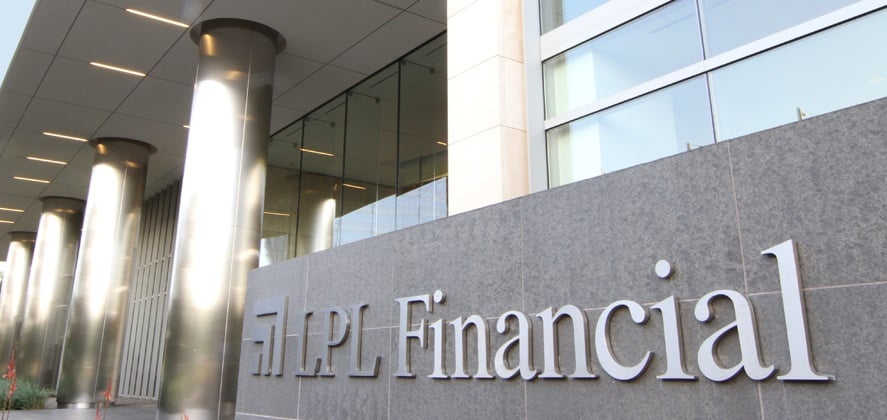LPL Financial Holdings Inc. is being sued for a stock buyback program that cost the company and ultimately its shareholders $115 million, according to a class action complaint filed Tuesday.
The complaint, filed in U.S. District Court in the Southern District of California on behalf of a Michigan pension plan, the Charter Township of Clinton Police and Fire Retirement System, focuses on the steps LPL took late last year to repurchase $250 million of company shares.
When LPL announced the stock buyback program — $500 million in total — on Oct. 29, company shares closed trading at $42.91. About six weeks later, the stock began a decline, culminating in a one-day 35% plunge on Feb. 12 after the company announced
fourth-quarter earnings the previous day of 37 cents per share, well below analysts' estimates of 51 cents per share. On Wednesday morning, LPL's shares were trading at $25.08 per share, a drop of 41.6% since the end of October.
LPL Financial Holdings is the parent company of LPL Financial, the nation's largest independent broker-dealer network with more than 14,000 registered reps and financial advisers.
Named in the complaint are LPL Financial Holdings, CEO and chairman Mark Casady, and chief financial officer Matthew Audette.
The heart
of the complaint focuses on Mr. Casady's and Mr. Audette's positive comments about the company during a Dec. 8 financial services conference sponsored by Goldman Sachs. For example, the complaint cites the statement that the share repurchase plan was the "best use" of the company's capital because of the then-current price. Both gave other positive assessments of LPL, according to the complaint, including that commission revenues were slow in the fourth quarter but would be similar to the third quarter. In fact, alternative investment revenues “would drop a staggering 75% year-over-year,” according to the complaint.
Source: Robbins Geller Rudman & Dowd
“As a result of the defendants' false statements, LPL common stock traded artificially high during the class period of December 8, 2015, to February 11, with its shares reaching a high of $45.06 on December 8, the day of the [Goldman Sachs] conference,” according to the complaint.
Mr. Casady and Mr. Audette “knew that the adverse facts specified herein had not been disclosed to and were being concealed from the public, and that the positive representations being made were then materially false and misleading,” according to the complaint.
Brett Weinberg, an LPL spokesman, said the company declined comment because of the pending litigation. Mr. Weinberg also did not comment when asked specifically about the share repurchase cost of $115 million to LPL and its shareholders allged in the lawsuit.
On Oct. 29, LPL announced it was implementing a new capital management plan to enhance shareholder value, and key to this plan was a $500 million share repurchase program authorized by LPL's board of directors, according to the complaint. On Nov. 24, LPL announced it had entered into $700 million of new term loans and extended $631 million of existing debt, in part to pay for the accelerated share repurchase plan, according to the complaint.
On Dec. 10, the company said it had reached an early completion of the share repurchase plan, stating that a company insider, the private equity manager TPG Capital, had approached LPL's investment bank, Goldman Sachs, about selling a block of shares, providing the opportunity to settle the accelerated buyback more quickly, according to the complaint.
TPG, which is not named in the complaint, has a long history with LPL. It was one of two private equity managers that bought a majority stake in LPL in 2005 from its founder, Todd Robinson. Five years later, it shepherded the company to its initial public offering, at $30 per share. After the IPO, TPG “retained a substantial ownership stake in the company and influence over its affairs,” according to the complaint, including two TPG partners serving as directors of the company. At the end of 2014, TPG owned approximately 13% of the outstanding shares of LPL common stock, according to the complaint.
Luke Barrett, a spokesman for TPG, said the company declined to comment.
LPL's December share repurchase was a boon for TPG and a disaster for LPL, according to the complaint.
“TPG sold 4.3 million shares of LPL common stock at $43.27 per share to Goldman to be delivered to the company through the accelerated share repurchase program,” according to the complaint. “As a result, TPG generated approximately $187 million in insider sales proceeds.”
“Notably, if TPG sold the same 4.3 million shares of LPL stock to the company at the February 12, 2016 closing price [of $16.50 per share], its sales proceeds would have been diminished by approximately $115 million,” according to the complaint. “By the same token if LPL had waited to purchase shares from TPG until after announcing its fourth quarter results, it could have purchased the same number of shares from TPG for $115 million less. Thus, its purchase from TPG of LPL shares at $43.27 per share was a wasteful and inefficient use of company capital.”







